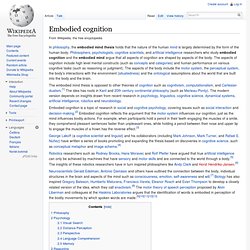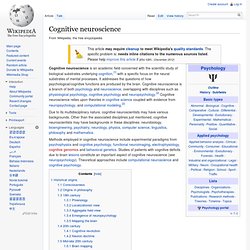

Embodied cognition. In philosophy, the embodied mind thesis holds that the nature of the human mind is largely determined by the form of the human body.

Philosophers, psychologists, cognitive scientists, and artificial intelligence researchers who study embodied cognition and the embodied mind argue that all aspects of cognition are shaped by aspects of the body. The aspects of cognition include high level mental constructs (such as concepts and categories) and human performance on various cognitive tasks (such as reasoning or judgment). The aspects of the body include the motor system, the perceptual system, the body's interactions with the environment (situatedness) and the ontological assumptions about the world that are built into the body and the brain.
Philosophy[edit] Psychology[edit] BrainCityParis. Cognitive neuroscience. Cognitive neuroscience is an academic field concerned with the scientific study of biological substrates underlying cognition,[1] with a specific focus on the neural substrates of mental processes.

It addresses the questions of how psychological/cognitive functions are produced by the brain. Cognitive neuroscience is a branch of both psychology and neuroscience, overlapping with disciplines such as physiological psychology, cognitive psychology and neuropsychology.[2] Cognitive neuroscience relies upon theories in cognitive science coupled with evidence from neuropsychology, and computational modeling.[2]